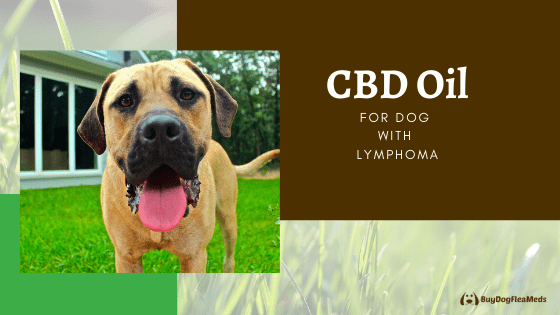CBD oil for Dogs Lymphoma
Did you know that dogs and cats may develop lymphoma, a type of cancer that is commonly attributed as a human disease?
What Is Lymphoma in Dogs?
Lymphoma, a white blood cell cancer, is one of dogs and cats ‘ most prevalent cancers. It may occur in both lymph nodes and organs such as spleen, liver, intestinal tract, and skin. In dogs, non-painful enlargement of the lymph nodes of the body is the most prevalent presentation-typically under the jaw, in front of the shoulders and behind the ankle.
The gastrointestinal tract is the most common place of lymphoma in cats.
What are the different types of lymphoma in dogs and cats?
There are over 30 distinct kinds of recognized canine lymphomas, all varying in aggressiveness, rates of survival, and clinical signs. These include:
Multicentric Lymphoma
- Fever
- The swellings are firm yet moveable as well as not agonizing
- Dehydration
- Sleepiness
- Anorexia nervosa
- Swollen lymph nodes that may become lumps of up to 10 times bigger than the normal size
- affects the lymph node
Alimentary Lymphoma
- Weight-loss
- Throwing up
- Anorexia nervosa
- Stomach discomfort
- Diarrhea
- affects the intestines
Mediastinal Lymphoma
- Excessive peeing
- Taking a breath troubles
- Excessive thirst
- Build-up of liquids in the breast cavity
- affects the thymus and the mediastinal lymph nodes in the chest area
Extranodal Lymphoma
- affects a specific organ
Cutaneous Lymphoma
What are the symptoms of lymphoma in dogs and cats?
The only sign that your dog has lymphoma is when their lymph nodes are enlarged. It is not painful, though, but it is a solid lump. As the disease proceeds, dogs can also experience lethargy, fever, anorexia, weakness, and dehydration. The intestines can also be affected. Your pet may experience vomiting, pain in the abdomen, anorexia, diarrhea, and weight loss.
The dog may have difficulty breathing, the face and front legs swell, and may experience uncontrolled urination.
How to prevent lymphoma in dogs and cats?
Minimize the use of flea and tick products. Fipronil in the popular flea and tick product was proven to cause thyroid cancer and reshape thyroid hormones. It can spread throughout the dog’s body. Permethrin has been indicated to be a cancer-causing agent.
Use lawn and garden products that are non-toxic. Such chemicals are toxic. The dogs and cats which are in contact to the low ground are prone to these toxins. A study shows a correlation between lawn chemicals and cancer in dogs. Use compost as it doesn’t have a harsh salt ingredient, unlike the other fertilizer’s description.
Use detergents, soaps, and cleansers that are safe for your pets. Keep in mind that the label can be wrong. Products can be labeled safe, but sometimes that can be misleading. Reaction of even citrus and pine-based cleaners to ozone air pollution combine to create ultra-fine particle that can harm the lungs.
Reduce the frequency of vaccination because malignant tumors of cats and dogs are often detected on the vaccination sites.
What are the natural home remedies for lymphoma of dogs and cats?
Give your pet with a cancer fighting diet. An extremely digestible and palatable diet containing comparatively small levels of simple carbohydrates, mild quantities of bioavailable protein, soluble and insoluble fiber, and omega-3 fatty acids can be useful to dogs having cancer.
Provide your pet with herbal lymphoma supplements. Immune-strengthening herbal supplements, along with supplements l intended to detoxify the body, are useful for canine lymphoma management. Examples of these are extracts from Japanese mushrooms, green tea extract and milk thistle that supports the liver. Some supplements with antioxidant properties may help.
Provide your pets with homeopathic lymphoma preparations. Homeopathy is based on the use of diluted doses of natural substances to create immunity. While homeopathy alone can possibly provide remission in about one in four or five instances, the greatest results can be seen when combining homeopathy with chemotherapy.
Acupuncture may relieve symptoms associated with the disease and chemo-related side effects depending on the place of a lymphoma.
CBD Oil for Dogs Lymphoma
One of the cancer treatment remedies available for animals is the use of cannabidiol (CBD) oil, a rapidly evolving alternative method. This oil is produced through the extraction of CO2 from hemp. CBD oil use has been demonstrated to be an effective method of human cancer treatment.
All mammals that include cats and dogs have an endocannabinoid system that can give them a positive response to the technique of treating CBD oil. Exposure to CBD oil from cancer cells triggers apoptosis or just putting, cancer cells suicide, and prevents the further development of tumors. CBD oil is also a holistic therapy strategy by interacting with the endocannabinoid system in a distinctive manner.
It addresses cancer’s adverse effects like inflammation, pain, and vomiting. This would give convenience and quality of life to your animals as they undergo therapy. It is also thought that CBD oil will help offer your pets a better opportunity of fighting by enhancing their appetite and encouraging excellent sleep.
Another benefit of CBD oil is that it does not harm the other healthy organs and cells of the dog or cat, especially their kidney, liver, and GI tract, since it is natural. And the animals are not left high or sedated if the correct dosage is followed.
In addition, studies on the use of CBD oil in mammals have discovered that side effects are extremely uncommon due to the right dosage (see our CBD dosage graph). It can also be used for synergistic therapy in addition to other traditional medicines..
How Much CBD Should Be Given to Dogs And Cats with Lymphoma?
CBD oil can be taken orally. You can mix CBD oil with their food. Whether you are using CBD hemp oil for anxiety or pain relief, the correct dose may differ slightly, depending on your pet’s condition. Some pets do not have as many receptors as others, and to discover the correct quantity and how often you may need to experiment.
Start at the low end of the range with a dose and expect outcomes to be seen in 30 – 60 minutes.
You can review my CBD Dosage calculator for dogs here.
References:
- https://www.oncolink.org/cancers/vet/common-veterinary-cancers/lymphosarcoma-in-dogs#targetText=Lymphosarcoma%20(lymphoma)%20is%20the%20third,gastrointestinal%20tract%20and%20bone%20marrow.
- https://www.innovetpet.com/blogs/recent-articles/find-relief-with-cbd-oil-for-lymphoma-in-dogs
- https://www.petmd.com/dog/conditions/cancer/c_dg_lymphoma
- https://www.purdue.edu/vet/pcop/canine-lymphoma-research.php
- https://www.akc.org/expert-advice/health/lymphoma-in-dogs-symptoms-diagnosis-and-treatment/

